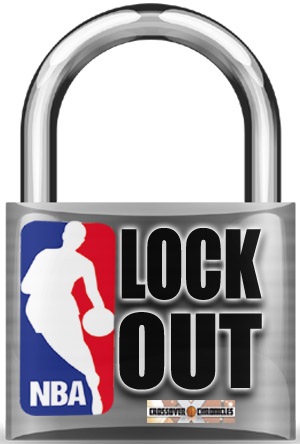 There is one key ingredient, in my opinion, to a successful negotiation: solidarity.
There is one key ingredient, in my opinion, to a successful negotiation: solidarity.
If your membership is split, it leads to behind-the-scenes arguments and compromises within your own negotiating group before you even compromise further with the other side. So when I hear that one side of this lockout is divided, I think it will lead to a quicker resolution to the lockout because that side lacks the resolve to drag this thing out.
But that’s not how it was characterized in the Oregonian this weekend.
Ominous news over the weekend. Multiple NBA sources whispered that there was a contingent of league owners eager to get a collective-bargaining deal signed, and a second, determined to drag the lockout into January or beyond, because they believe the league needs rectify a broken salary system at all costs.
I suppose I could be wrong about what this means. So I’ll explain my position and you tell me if I’m nuts (it wouldn’t be the first time).
First, let’s take this report at face value. I don’t know the sources and it’s possible this is mis-characterized, but for the sake of this piece, I’m just going with it.
Second, I’m making a leap here that big-market owners are generally fine with the current system (with Wyc Grousbeck of the Boston Celtics being a reported notable exception) and it’s primarily the small-market teams that are pushing the hard-line.
And Finally, I’m going to assume for the time being that the players are holding strong as a unified group. I’m not sure about this, but you’ll see as the scenario plays out why this is important.
When players and owners walk into negotiations, the owners are, behind David Stern, taking a hard-line stance with their hard salary cap and other roll-backs. The players, even under threat of lawsuit for bargaining in bad-faith, hold their ground. Not only do they not want to give in to that level of radical change, they are also aware, since this is now a public report, that the ownership group is prone to in-fighting. The NBPA offers no real concessions until the owners decide to move.
And the lockout drags on.
The longer it goes, the more money that gets lost. Owners who are willing to sign a deal that meets players somewhere in the middle now get antsy. TV revenue is being lost. They’ve got big payrolls. And even though they don’t have to pay those players during the lockout, they’ll have to pay them when basketball starts up again. And the longer this thing goes, the more likely you are to lose the casual fan. So the money won’t exactly be rolling in like it was before.
So these owners go to the small-market owners and start to plead. Maybe these meetings get heated, maybe they don’t. But now these guys are going to have to find some sort of middle ground to pull the hard-liners away from the edge. They’re now negotiating amongst themselves, rather than against the players.
From there, the owners come back to the bargaining table with a softer offer. One that is more palatable for the players. NOW the players can sweeten the deal by moving a little on their offer, showing they are willing to bargain, but not bending to Sterns’ and the owners’ will. At that point, the concessions come more swiftly, ending the lockout and salvaging a season.
At least, that’s how I see it going down. But when I see the word “ominous” to describe this situation, it makes me wonder if I’m wrong about how that plays out. So I’ll just throw it out to the group: Is word of a split among the owners bad news (because it will prolong this lockout and threaten a season) or is it good news (because the scenario I laid out will, in some form, transpire and we’ll get basketball at some point)?
